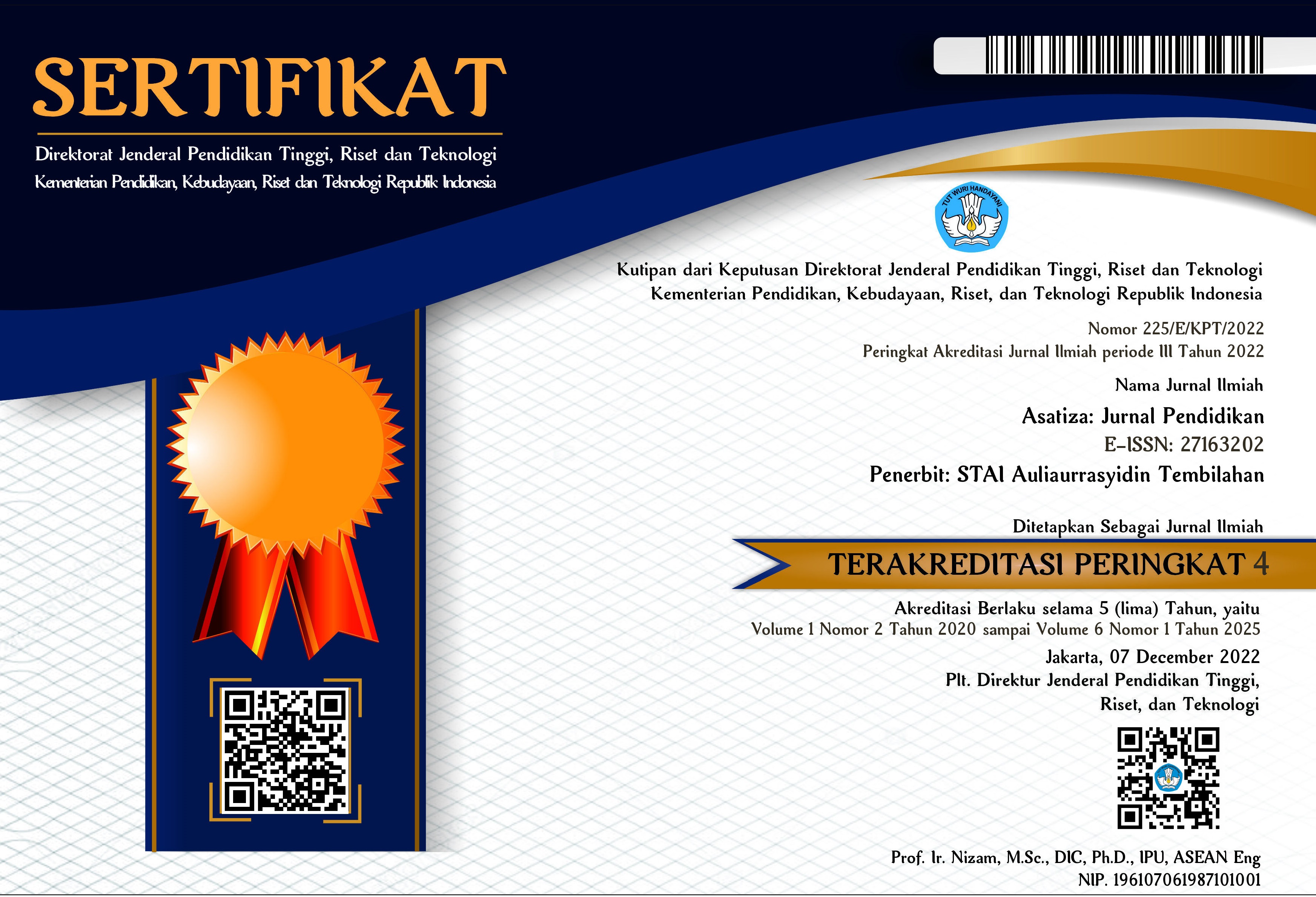The Potential of Social Media in Increasing Young Generation's Legal Education
DOI:
https://doi.org/10.46963/asatiza.v5i2.1473Keywords:
Legal Education, Social Media, Young GenerationAbstract
This research examines the role of social media in increasing legal awareness among the younger generation in Indonesia. As of January 2023, Indonesia had approximately 167 million social media users out of a total population of 276.4 million, highlighting a significant opportunity to enhance legal education. Despite this potential, the use of social media for raising legal awareness is minimal, reflected in high crime rates and low legal compliance. This study explores the urgency of legal education for the younger generation and the role social media can play in this effort. Using a literature review method, the research references relevant and reliable sources such as laws, books, journal articles, and official data. The meta-synthesis technique is applied to synthesize data from previous studies and draw conclusions. The findings indicate that legal education is crucial for improving legal awareness and compliance among the younger generation. Social media can significantly contribute by making legal information more engaging and accessible. The study recommends that the government utilize social media's potential in legal education by collaborating with private digital sectors and influencers to disseminate positive legal messages and raise awareness effectively.
Downloads
References
Amarini, I. (2018). Pencegahan dampak negatif perkembangan teknologi informasi terhadap pengguna internet. Kosmik Hukum, 18(1). https://doi.org/10.30595/kosmikhukum.v18i1.2340
Asmadi, E. (2021). Rumusan delik dan pemidanaan bagi tindak pidana pencemaran nama baik di media sosial. De Lega Lata: Jurnal Ilmu Hukum, 6(1), 16–32. https://doi.org/10.30596/dll.v6i1.4910
Cahyono, A. S. (2016). Pengaruh media sosial terhadap perubahan sosial masyarakat di Indonesia. Publiciana, 9(1), 140–157. https://doi.org/10.36563/publiciana.v9i1.79
Carr, C. T., & Hayes, R. A. (2015). Social media: Defining, developing, and divining. Atlantic Journal of Communication, 23(1), 46–65. https://doi.org/10.1080/15456870.2015.972282
Dataindonesia.id. (2022). Angka Kejahatan di Indonesia 2022. https://dataindonesia.id/varia/detail/polri-kejahatan-di-indonesia-naik-jadi-276507-kases-pada-2022
Datareportal.com. (2023). Digital Indonesia 2023. https://datareportal.com/reports/digital-2023-indonesia
Fitriani, Y. (2017). Analisis pemanfaatan berbagai media sosial sebagai sarana penyebaran informasi bagi masyarakat. Paradigma, 19(2), 148–152. https://doi.org/10.31294/p.v19i2.2120
Fuady, M. (2007). Sosiologi Hukum Kontemporer: Interaksi Hukum, Kekuasaan, dan Masyarakat. Bandung: Citra Aditya Bakti.
Hasibuan, Z. (2016). Kesadaran hukum dan ketaatan hukum masyarakat dewasa ini. Jurnal Justitia: Jurnal Ilmu Hukum dan Humaniora, 1(1), 78-92. http://dx.doi.org/10.31604/justitia.v1i01.%25p
Hermawan, S., & Budi Abiyudo, G. I. (2022). Potensi Penggunaan platform sosial media guna mengurangi sampah plastik di lautan Indonesia. Kosmik Hukum, 22(2), 132. https://doi.org/10.30595/kosmikhukum.v22i2.14140
Khasawneh, R. T., & Abu-Shanab, E. A. (2013). E-Government and social media sites: The role and impact. World Journal of Computer Application and Technology, 1(1), 10–17. https://doi.org/10.13189/wjcat.2013.010103
Laptev, V., & Fedin, V. (2020). Legal awareness in a digital society. Russian Law Journal, 8(1), 138–157. https://doi.org/10.17589/2309-8678-2020-8-1-138-157
Mirzayevich, K. B. (2022). Features of increasing the legal awareness and legal culture of young people. Miasto Przyszłości, 108–111. https://miastoprzyszlosci.com.pl/index.php/mp/article/view/183
Prakash Yadav, G., & Rai, J. (2017). The generation z and their social media usage: A review and a research outline. Global Journal of Enterprise Information System, 9(2), 110. https://doi.org/10.18311/gjeis/2017/15748
Purnama, H. (2011). Media Sosial di era pemasaran 3.0 corporate and marketing communication. Jakarta: Pusat Studi Komunikasi dan Bisnis Program Pasca Sarjana Universitas Mercu Buana.
Rafiq, A. (2020). Dampak media sosial terhadap perubahan sosial suatu masyarakat. Global Komunika: Jurnal Ilmu Sosial Dan Ilmu Politik, 3(1), 18–29. https://doi.org/10.33822/gk.v3i1.1704
Rahayu, S., Satrio, N., Suntara, R. A., & Ramadhani, T. (2022). Penanaman karakter anti korupsi unsur pemerintah Desa Juru Seberang Kecamatan Tanjung Pandan. Jurnal Dedikasi Hukum, 2(3), 308–316. https://doi.org/10.22219/jdh.v2i3.23512
Rosana, E. (2014). Kepatuhan hukum sebagai wujud kesadaran hukum masyarakat. Jurnal Tapis: Jurnal Teropong Aspirasi Politik Islam, 10(1), 61–84. http://dx.doi.org/10.24042/tps.v10i1.1600
Satrio, N., & Toni, T. (2022). Independensi Pengawasan Anggota Lembaga Perlindungan Saksi Dan Korban. Progresif: Jurnal Hukum, 15(2), 183–196. https://doi.org/10.33019/progresif.v16i2.2726
Sembiring, T. B., Maruf, I. R., Suryadi, S., Suyani, S., & Amin, M. (2022). Understanding the role of social media in shaping millennial generation legal awareness in the digital age. Budapest International Research and Critics Institute-Journal (BIRCI-Journal), 5(3), 18501–18511. https://doi.org/10.33258/birci.v5i3.5836
Soekanto, S. (1982). Kesadaran Hukum dan Kepatuhan Hukum, Edisi Pertama, Jakarta: CV. Rajawali.
Suntara, R. A. (2022). Penguatan karakter peduli sosial generasi muda melalui komunitas pegiat sosial dan pendidikan. JIPIS, 31(2), 97–106. https://ejournal.unis.ac.id/index.php/JIPIS/article/view/3225
Suntara, R. A. (2022). Peran pendidikan kewarganegaraan sebagai pendidikan hukum bagi warga negara. Scripta: Jurnal Kebijakan Publik Dan Hukum, 2(II), 307–316. http://journal.puskapkum.org/index.php/scripta/article/view/26
Suntara, R. A. (2023). Peran komunitas hopeeducation dalam pengembangan civic virtue generasi muda Bangka Belitung. Jurnal Ilmiah Mimbar Demokrasi, 22(2), 181–187. https://doi.org/10.21009/jimd.v22i2.29725
Wearesocial.com. (2023). Digital 2023. https://wearesocial.com/uk/blog/?query=post&filter-insight-type=report&filter-topic=social-media
Wearesocial.com. (2023). Digital Indonesia 2023. https://www.slideshare.net/DataReportal/digital-2023-indonesia-february-2023-v01
Downloads
Published
Issue
Section
License
Copyright (c) 2024 Reza Adriantika Suntara, Ndaru Satrio, Muhammad Syaiful Anwar

This work is licensed under a Creative Commons Attribution-ShareAlike 4.0 International License.
Authors who publish with this journal agree to the following terms:
1. Copyright on any article is retained by the author(s).
2. The author grants the journal, right of first publication with the work simultaneously licensed under a Creative Commons Attribution shareAlike 4.0 International License that allows others to share the work with an acknowledgment of the work’s authorship and initial publication in this journal.
3. Authors are able to enter into separate, additional contractual arrangements for the non-exclusive distribution of the journal’s published version of the work (e.g., post it to an institutional repository or publish it in a book), with an acknowledgment of its initial publication in this journal.
4. Authors are permitted and encouraged to post their work online (e.g., in institutional repositories or on their website) prior to and during the submission process, as it can lead to productive exchanges, as well as earlier and greater citation of published work.
5. The article and any associated published material is distributed under the Creative Commons Attribution-ShareAlike 4.0 International License











2.png)



